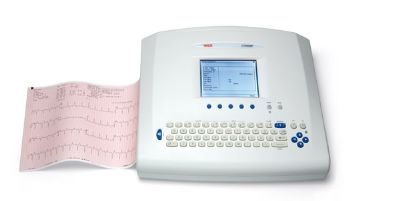An electrocardiogram, abbreviated as ‘ECG,’ is a diagnostic tool that captures the heart’s electrical activity. The myocardium generates minute electrical impulses that propagate through the cardiac muscle, prompting myocardial contraction. These electrical signals are discernible by the ECG apparatus. An ECG may be conducted to elucidate the etiology of clinical manifestations such as palpitations or angina pectoris. It is also utilized as a routine evaluative measure, for instance, preoperatively and during comprehensive health assessments at Dublin Health Screening.
The ECG procedure is both painless and non-invasive. (The ECG machine merely records endogenous electrical signals from the body without introducing any external electrical current.)
Procedure:
Electrodes, which are small metal sensors, are affixed to the patient’s limbs and thorax. Lead wires from the electrodes connect to the ECG machine. The device detects, amplifies, and records the cardiac electrical impulses onto paper or a digital medium. Multiple heartbeats are recorded from different electrode configurations. The entire procedure typically takes approximately five minutes.
Interpretation of an ECG:
The electrodes positioned on various anatomical sites capture electrical impulses emanating from multiple vectors within the heart. Each electrode has a normative pattern. Pathological cardiac conditions manifest as deviations from these normal patterns. The ECG can identify several cardiac pathologies, including:
- Cardiac arrhythmias: Aberrant heart rhythms, whether tachycardic, bradycardic, or irregular, each with distinctive ECG patterns.
- Myocardial infarction: The ECG can indicate both recent and historical myocardial infarctions. Infarcted myocardial tissue heals with fibrotic scarring, which is evident as abnormal patterns on the ECG.
- Cardiomegaly: This condition results in amplified electrical impulses due to the enlarged cardiac muscle mass.
The aforementioned details pertain to the computer-analyzed ECGs utilized at Dublin Health Screening, located at 4 Fitzwilliam Square. Below is a synopsis of our ECG machines’ capabilities, which are seamlessly integrated with our Health One program and stored digitally on our internal servers. The ECG data undergoes dual analysis by both the server system and our medical professionals. Any ECG tracings that raise concern among our physicians are electronically forwarded for peer cardiological review. Depending on the findings, an in-house exercise stress test may be recommended.
Capabilities of our ECG machines include:
- All functionalities of the CT8000P, excluding the on-screen tracing preview
- Provision for paperless ECG options in conjunction with Archimed Passport Software
- A 12-channel high-resolution interpretive ECG with an LCD for menu navigation and an alphanumeric keyboard
- High-quality interpretive software for both adult and pediatric patients
- Selection of traces from 12 x 1, 6 x 2, or the popular 4 x 3 plus rhythm strip on a single-page report
- On-screen lead test and lead-off indication
- One-touch automatic or instant real-time operation
- High-quality digital filters for clear tracings, including filters for mains interference, baseline drift, and muscle tremors
- Internal memory capable of storing up to 45 ECG records
- All parameters, including filters, are easily programmable via the on-screen menu for one-touch ECG acquisition
- Dedicated one-touch keys for storing, printing, and transmitting data

